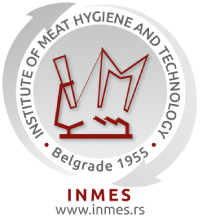Effect of genotype on certain physico-chemical characteristics of rabbit meat
Abstract
Basic chemical composition (water, proteins, fats, ash), water holding capacity and cooking loss of rabbit meat (Oryctolagus cuniculus) were investigated. The meat originated from three different genotypes (New Zealand White, Californian and crossbred between these two breeds). Animals were fed exclusively by their mother’s milk up to 30 days of age and then up to 90 days by commercial food, ad libitum. Before slaughtering, rabbits had an average live weight of 2038.17 g. Muscles from the hind legs from 21 animals (7 of each genotype) were taken for examining, 48 hours post mortem. Chemical composition was determined according to the standard methods. Water holding capacity by Grau-Hamm filter paper press method. Cooking loss by dipping the meat pieces, weighing 10 g, into the boiling water for 10 minutes, as well as by roasting the chops in electric oven at 180 °C to an internal temperature of 78°C. On average rabbit meat contained 74.49% of water, 21.79% of proteins, 2.78% of fats, 1.24% of ash and its energy value was 494.79 kJ/100 g. The content of free water in the meat amounted, on average, 52.28% and bound water was 22.21%. Genotype showed no significant effect on chemical composition and water holding capacity of meat. During boiling the meat, on average, it loses 32.73% from its weight and 38.11% during its roasting. Cooking loss was significantly (P<0.05) lower in meat from crossbreds.





